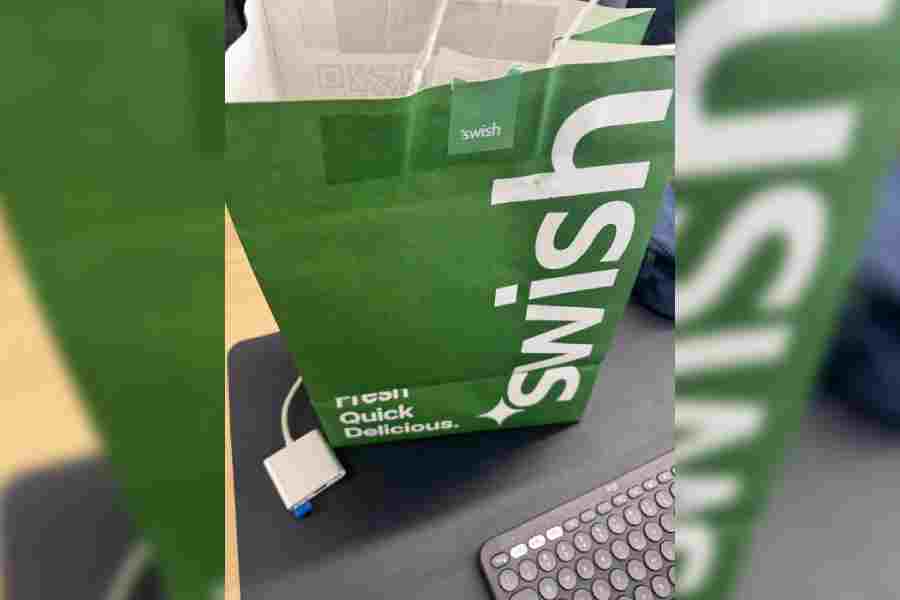Three clicks, 600 seconds and hot, fresh food at your doorstep. That’s the promise held out by Bengaluru-based rapid food delivery startup Swish that uses optimised cloud kitchens and hyperlocal focus to meet customer needs, be it an after-lunch coffee or a snack craving, says CEO Aniket Shah.
“We control every aspect of the process -- from food preparation to packaging to delivery -- via what we call `delight centres',” Shah told PTI.
The idea behind Swish began with a simple observation: while quick commerce had rewritten the rules of retail play, 30-60 minute timelines continued to be the norm in food delivery. Shah, with co-founders Ujjwal Sukheja, and Saran S, moved quickly to fill this gap with a "hyperlocal, ultra-fast food delivery service that prioritises quality, hygiene, and speed".
"This hyperlocal focus ensures that food is always hot, fresh, and hygienic when it reaches our customers, enabling us to meet our 10-minute promise," Shah said.
Swish recently made headlines when it raised USD 2 million in seed funding led by Accel and a clutch of prominent angel investors, including Urban Company founders Abhiraj Bhal and Varun Khaitan and former Swiggy Instamart head Karthik Gurumurthy. The funding will primarily support expansion efforts and the scaling of the rapid-delivery model, according to the company.
"Our vision is to expand across India and establish ourselves as the leader in this evolving market," said Shah.
Excerpts from the interview: Q: Can you tell us how Swish came about and how you manage to deliver food in just 10 minutes? A: Swish was founded earlier this year by Saran S, Ujjwal Sukheja and me. The idea stemmed from a simple observation: while quick commerce has transformed other categories, food delivery times still range between 30 and 60 minutes. We saw an opportunity to address this gap for customers who demand immediate solutions to their cravings or unplanned food needs.
Swish was born to offer a hyperlocal, ultra-fast food delivery service that prioritises quality, hygiene, and speed.
Our full-stack model is the foundation of our success. We control every aspect of the process-from food preparation to packaging to delivery - via what we call `delight centres'.
These are optimised cloud kitchens strategically located and delivering in a compact service radius of 1.5 to 2 kilometres. This hyperlocal focus ensures that food is always hot, fresh and hygienic when it reaches our customers, enabling us to meet our 10-minute promise.
Q: The quick commerce market is becoming highly competitive. What makes Swish stand out? A: Our end-to-end control and unwavering focus on quality set us apart. Unlike others in the space who rely on third-party kitchens or delivery partners, we’ve built our capabilities from scratch.
This allows us to ensure seamless efficiency while maintaining an exceptional customer experience. Our delight centres are optimised for speed and scalability, designed to safely meet our 10-minute delivery promise. We also focus on innovation and process optimisation at every step.
Quick commerce is rapidly becoming the norm, and we believe Swish will soon be synonymous with ultra-fast, high-quality food delivery. Our vision is to expand across India and establish ourselves as the leader in this evolving market.
Q: How do you plan to utilise the USD 2 million funding you’ve just raised? A: The funding will primarily support our expansion efforts and the scaling of our rapid-delivery model. We started in HSR Layout, Bengaluru, and have already expanded to areas like Bellandur.
By March 2025, we plan to establish 150 `delight centres' across Bengaluru and then expand to other Tier-1 cities.
Q: Who are Swish’s primary customers? Can you share insights into user demographics or behavioural patterns from your initial markets? A: Today, Swish is used by office-goers, students, busy families, and anyone with a need for a quick, healthy, tasty meal. Apart from convenient meals, given we can deliver in like six-seven minutes often, Swish is extensively used for round-the-clock snacks and cravings like chai, samosas and Maggi.
Given our quick-service model, we are able to unlock new demand such as hosting impromptu parties, quick office snacks, after-lunch cup of coffee, etc. We expect to be there whenever our user has a need for a quick food or beverage.
Q: What technological innovations or proprietary systems does Swish use to ensure its 10-minute delivery promise while maintaining quality and safety standards? A: This requires innovation at every step of the way. For example, we have built our in-house order prioritisation engine that efficiently queues orders in our kitchen system based on various data points in real-time.
We’ve also built algorithms for demand planning and utilisation forecasting to consistently give the best experience to our users. We have reconceptualised how our cloud kitchens, or 'delight centres' as we call them, should look like in terms of the layout, optimal staff utilisation, food science, etc.
Our app experience is extremely seamless, ensuring the consumer gets their food in three clicks and 600 seconds.
Q: What is your long-term vision for Swish? A: We believe the future of food delivery lies in hyperlocal, tech-enabled rapid delivery systems. Our vision is to make Swish synonymous with ultra-fast and become the most delightful food delivery platform in the country..
By continuing to innovate, we aim to scale our model across India, expand to other Tier-1 cities and lead the evolution of quick commerce in the food sector.
Except for the headline, this story has not been edited by The Telegraph Online staff and has been published from a syndicated feed.











